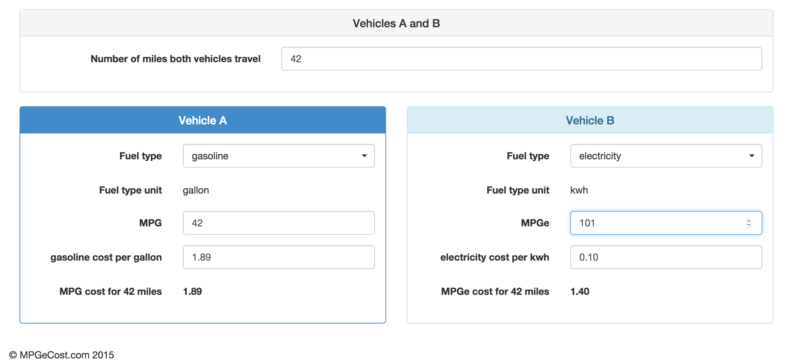createthis
Member
I discovered MPGe was a little misleading about a week and a half ago while I was digging through this forum and the Chevy Volt forum after test driving a Nissan Leaf. I was so surprised by this, I did a bunch of math to figure out what MPGe really means, then translated that math into a website where everyone can do MPGe Cost comparisons for free. Check it out:
http://www.mpgecost.com
All you need to know to use the calculator is your current cost of electricity per kwh ( I have EPB/TVA electric, so that's 10 cents per kwh for me ), the cost of gas in your area ( currently 1.89 in my neck of the woods ), and the MPGe of your electric vehicle. ( I think the 2016 Nissan Leaf is 126 city or 101 hwy, so take your pick for where you're driving it )
To get a feel for how this works, here's a screenshot from the calculator using the Chevy Volt's 42 MPG gas vs the Nissan Leaf's city MPGe:

I'm really not trying to start a flame war or anything with Volt vs Leaf. I swear. These just happen to be the two vehicles I was looking at when I started doing these calculations. I think the numbers are interesting.
Hope someone finds this useful or interesting. Electric is still more cost effective per mile than gas, even at today's prices, but the difference isn't quite as large as I thought, if you own a hybrid. Of course, use a more traditional gas vehicle's 18 MPG or use higher gas prices and the winner becomes more black and white. Enjoy!
--
Jesse
http://www.mpgecost.com
All you need to know to use the calculator is your current cost of electricity per kwh ( I have EPB/TVA electric, so that's 10 cents per kwh for me ), the cost of gas in your area ( currently 1.89 in my neck of the woods ), and the MPGe of your electric vehicle. ( I think the 2016 Nissan Leaf is 126 city or 101 hwy, so take your pick for where you're driving it )
To get a feel for how this works, here's a screenshot from the calculator using the Chevy Volt's 42 MPG gas vs the Nissan Leaf's city MPGe:

I'm really not trying to start a flame war or anything with Volt vs Leaf. I swear. These just happen to be the two vehicles I was looking at when I started doing these calculations. I think the numbers are interesting.
Hope someone finds this useful or interesting. Electric is still more cost effective per mile than gas, even at today's prices, but the difference isn't quite as large as I thought, if you own a hybrid. Of course, use a more traditional gas vehicle's 18 MPG or use higher gas prices and the winner becomes more black and white. Enjoy!
--
Jesse
